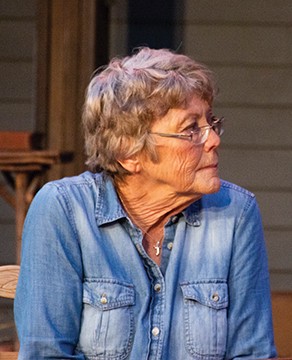A number of years ago there was a craze for bracelets with the initials “WWJD” which stands for “What would Jesus do?” Surely this is a worthy question, but the sheer number of those bracelets sold and worn all but ensured that somewhere along the line, some wearer of one of these bracelets might have gotten the answer wrong.
Continuing at Theatre in the Park in New Salem Aug. 29-31, Walking Across Egypt, is a bit like one of those bracelets, but complete with a healthy sense of humor, big laughs and humility.
Based on a beloved novel by Clyde Edgerton, Walking Across Egypt, adapted for the stage by Catherine Bush, follows Mattie Rigsbee, an aging widow (played to perfection by Pat Pennington), on a personal journey from quiet despair to redemption.
The setting is a Mayberry-like small town USA, full of colorful, caring, but imperfect characters. The beautiful production directed by Phil Funkenbusch is wise, witty, down-home and real.
Mattie repeatedly states, “I’m slowing down.” But it it’s more than the typical complaint of a once active, now aging, woman. She laments her loss in a visceral image, describing again and again the loss as an “upside-down waterfall” that once poured from her heart and spirit and that had been her connection to both the divine and her loved ones and neighbors. Part of her journey in Walking Across Egypt is to find once again the inner source of that “waterfall” and also a worthy object of love.
The catalyst is a stray dog on her back porch, a call to the dogcatcher Lamar Benfield, (played with understated charm by Will Acton) and an introduction to Will’s very young, very troubled, and very incarcerated nephew Wesley (the fine Quincy Stuhmer).
Walking Across Egypt is consistently funny and often hilarious, yet it brings up a serious question, one posed by the sages and the ages. When we are admonished to “love our neighbor” and to care for “the least of these,” who is the object of that attention? Do we raise money to send missions to the faceless (and safely distant) “billion Chinese,” or do we risk much more to help the wayward and potentially unstable orphan in our neighborhood?
That is the choice Mattie must make. And to save herself, she chooses the more dangerous path. She takes in Wesley, a vulnerable, damaged, abandoned child pretending to be a man. She does so against reason, the “good sense” and sensibilities of her well-meaning family (her son Robert is affectingly played by Bruce Davidson) her narrow-minded neighbors and the advice of her spiritual leader. Her community may be conventionally “right,” but there is grace and power in the actions of this selfless woman.
Mattie’s hilariously busybody neighbors win the affection of the audience. Alora is played by Lisa Hellman and, along with Bob Morgan as her gun-toting, camo-wearing husband Finner, she steals the show. The running jokes about lasagna in the oven and police scanners get big laughs, but there is more to Alora and Finner than easy one-liners. Their over-the-top concern for Mattie’s well-being illuminates the delusion of our us-versus-them culture, and heightens the tensions over Mattie’s decision to help the juvenile delinquent Wesley. With their worldview that, in Finner’s words, guns are the “only thing between us and the criminal element,” they ratchet up the stakes on Mattie’s situation. It’s all played for laughs, of course, and those laughs are well deserved.
More serious, yet still played for rueful humor, is the anodyne hypocrisy of the Minister, Reverend Bass, mostly sympathetically portrayed by Patty Noonan. She leads the hymns, preaches to us (and, yes, to the “choir”) and quotes from Matthew 25 the famous words that motivate Mattie’s decision:
“Verily I say unto you, inasmuch as ye have done it unto one of the least of these my brethren, ye have done it unto me.”
And yet, after Mattie has announced that she intends to put those words into action, the Minister questions whether Mattie can be trusted to oversee raising funds for foreign missions. Risking one’s reputation and safety to help an unfortunate local boy is clearly not, to Minister or her flock, what Jesus had in mind.
Rounding the main cast is Dennis Frye as Sheriff Tillman, representing both blind authority and a voice of reason.
Director Funkenbusch makes the sprawling permanent unit set at Theater in the Park seem intimate. The use of the constantly-on-stage choir as a kind of Greek Chorus is genius. Commenting on the action, they sing well-known hymns, and the audience is invited to join in, making delightful moments of connection and community. The choir is constantly watching, holding as it were a mirror up to the action. At one point a choir member steps out as if to enter the drama more closely, apparently to reprove one of the other characters or to attempt reconciliation. But like most of us do in times of conflict, she hesitates. The moment is lost, and she returns to her place, a watcher (like the rest of us in the audience), not a doer. Dennis Darling provides the capable musical direction.
All the hymns are from the well-known repertoire (and the audience does join in, with gusto), except for the title song, “Walking Across Egypt,” with words and music by the creator of the story, the novelist Edgarton. The song feels like it’s been around forever, in a good way.
The costumes by Teri Fink are perfect, as are the lighting by Dan Hecht and the sound by Justin Duckwiler.
Walking Across Egypt is a genial, constantly entertaining voyage, with a heart of gold and a message of love and reconciliation. It will leave you asking yourself questions about punishment and forgiveness, and perhaps even, “What would I do to help someone in need?”


